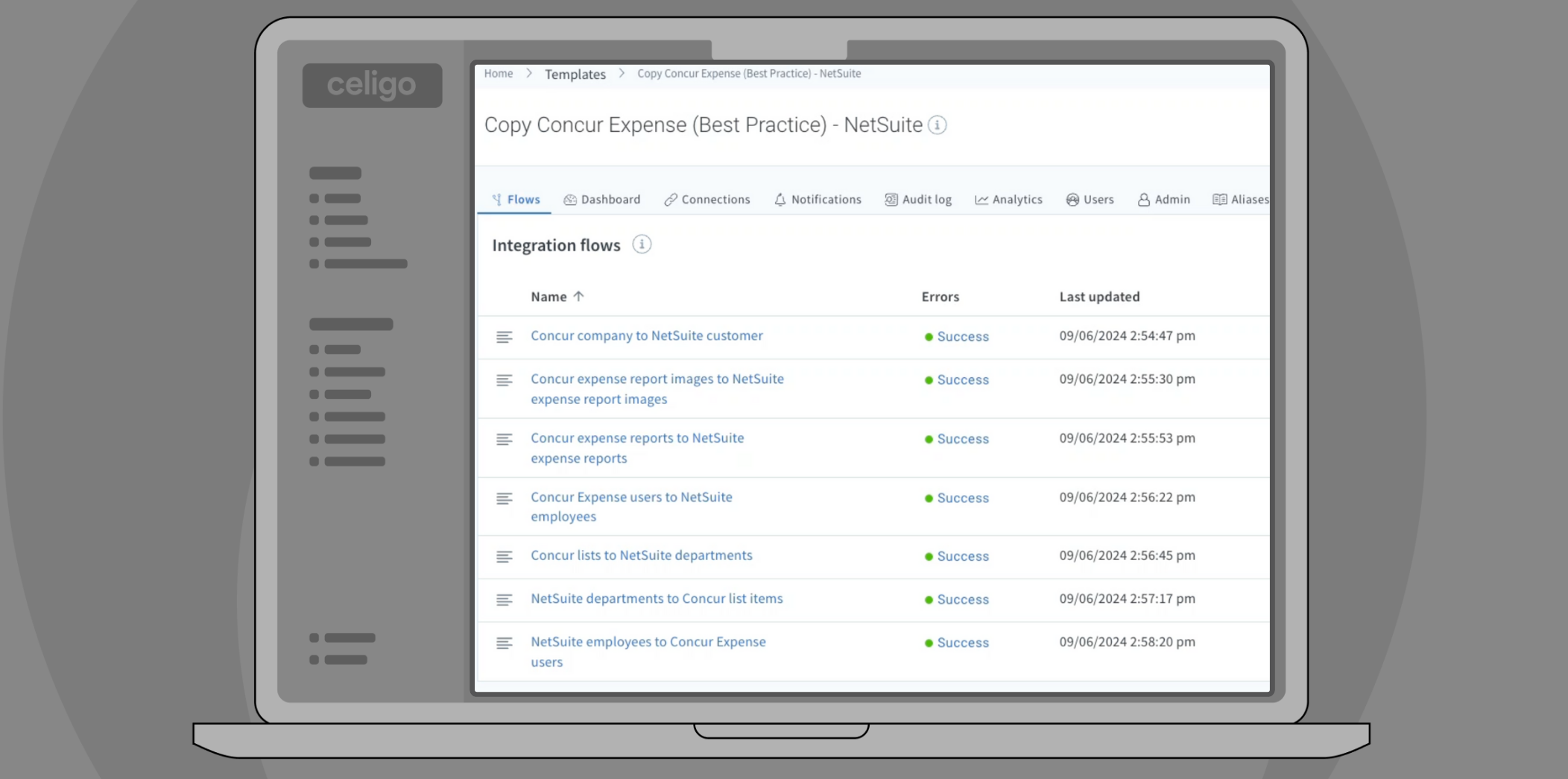Published Sep 30, 2024
Trends in iPaaS and how they enhance ERP systems
Explore the latest iPaaS trends and their impact on ERP integration
How is the power of integration platforms revolutionizing business operations in today’s dynamic business landscape? In this blog, we’ll explore the latest trends in integration technologies and how they enhance ERP (enterprise resource planning) systems, leading to improved data consistency, scalability, and efficiency. While multiple integration options are available to companies, we’ll focus on iPaaS (Integration Platform as a Service) in this blog. iPaaS solutions are the most comprehensive integration technology, and they cover the majority of integration patterns, from simple data transformation, through integrating systems between different businesses, all the way to end-to-end process automation.
Key takeaways: Enhancing ERP systems with iPaaS
- Most iPaaS platforms provide tools for building integration flows, managing and executing integrations, and enforcing governance.
- Modern iPaaS solutions incorporate emerging trends like hybrid integration, AI and machine learning capabilities, low-code/no-code development, API management, and enhanced security and compliance features.
- By integrating ERP systems with other core applications through a modern iPaaS, businesses can automate processes, optimize data flow, scale efficiently, and deliver a seamless customer experience.
- Pairing NetSuite with Celigo enhances ERP functionality by enabling powerful automation, seamless integration, and adaptability to future advancements in AI and security.
Understanding iPaaS
Research firm Gartner defines iPaaS as “a suite of cloud services enabling development, execution and governance of integration flows connecting any combination of on-premises and cloud-based processes, services, applications and data within individual or across multiple organizations.”
Key components of iPaaS
- Development: Tools and frameworks to build integration flows.
- Execution: Platforms to run and manage these integrations.
- Governance: Ensuring integrations comply with organizational policies and standards and monitoring their stability.
Current trends in iPaaS
Hybrid integration
Hybrid integration, which combines on-premises and cloud-based systems, is becoming increasingly popular. Gartner emphasizes that a hybrid integration approach empowers digital transformation by allowing organizations to leverage the strengths of both environments. This approach supports the diverse integration needs of modern businesses, providing flexibility and scalability. By moving away from task-specific tools towards a more holistic hybrid integration platform (HIP), companies can ensure seamless connectivity, data flow, and operational efficiency. This approach helps businesses in two significant ways. First, it allows for gradual modernization, enabling companies to adopt new technologies at their own pace without disrupting existing operations. Second, it provides a competitive edge by facilitating faster innovation and market responsiveness, as businesses can quickly integrate new tools and services to meet changing market demands.
AI and Machine Learning integration
Artificial Intelligence (AI) and Machine Learning (ML) are revolutionizing iPaaS by automating complex integration tasks and enhancing data processing capabilities. Key applications include:
- Predictive maintenance: Analyzing data from sensors to predict equipment failures, reducing downtime and operational costs.
- Smart data mapping: Automatically mapping data fields between systems, learning from previous mappings to improve accuracy.
- Anomaly detection: Monitoring data flows in real-time to detect irregular patterns, ensuring data integrity and security.
- Enhanced customer insights: Gaining deeper insights into customer behaviors and preferences, enabling personalized marketing strategies.
iPaaS enables these capabilities for the business by plugging in multiple sources of data into the relevant tools, making them more efficient and better suited to meet the evolving needs of modern enterprises.
Low-Code/No-Code platforms
Low-code and no-code platforms are transforming software development by making it more accessible and efficient. Modern iPaaS platforms enable faster application development with minimal coding.
Key benefits include:
- Increased efficiency: These platforms reduce development time of integration flows and reduce costs with prebuilt components and visual interfaces.
- Empowering citizen developers: An iPaas with low/no code options allows business users to actively work on integrations and manage them, instead of making IT resources a bottleneck.
- Addressing the skills gap: These platforms bridge the skills gap by enabling non-technical users to build functional software, which is especially valuable in a world with a shortage of coding experts.
- Agility: Allowing businesses to expand globally more quickly by easily onboarding and integrating new local business partners and 3PLs (third-party logistics) with their systems.
These platforms enable businesses to innovate faster and respond to changing market conditions more effectively. However, it’s essential to consider factors such as project complexity, scalability, and vendor lock-in when choosing a low-code or no-code platform.
API management and connectivity
Robust API management is crucial for modern iPaaS solutions. APIs (application programming interfaces) enable seamless connectivity between disparate systems, ensuring smooth data flow and integration. Advanced API management tools help businesses create, monitor, and secure APIs, facilitating reliable and scalable integrations. This allows enterprises to expose certain facets of their business for integration by third parties so that they can develop their own integrations as needed.
Security and compliance enhancements
As data security and regulatory compliance become more critical, iPaaS providers are enhancing their security features. Advanced encryption, identity management, and compliance monitoring tools are being integrated into iPaaS solutions to protect sensitive data and ensure adherence to regulations such as GDPR and HIPAA.
Enhancing ERP systems with iPaaS
Improved data integration and flow
iPaaS facilitates seamless data integration between ERP and other systems, ensuring real-time data flow and improving decision-making. This integration eliminates data silos, providing a unified view of business operations which ultimately means there is less compliance risk and more efficient decision-making can be made.
Scalability and flexibility
iPaaS offers scalability advantages for ERP systems, allowing businesses to easily adapt to changing needs. With iPaaS, companies can scale their integrations up or down based on demand, ensuring their ERP systems can grow alongside their business and evolving tech stacks. Whether you are looking at migrating from legacy applications in the future or bringing on new additional tools, you can accomplish this in a phased approach, without disrupting ongoing business operations, with an iPaaS platform.
Enhanced automation and efficiency
Automation is a key benefit of integrating ERP systems with iPaaS. By automating routine tasks and data transfers, businesses can reduce manual effort and minimize errors. An example of this could be creating orders automatically in your ERP system when they are generated by third party online marketplaces, like Amazon, or automatically adding return information to an order when a customer requests a refund. This brings about increased operational efficiency and frees up resources for more strategic activities.
Better customer experience
Integrated systems lead to a better customer experience by providing a seamless flow of information across different touchpoints. For example, customer data from various channels can be integrated into the ERP system, enabling personalized and timely customer interactions. Furthermore, iPaaS systems can significantly enhance customer experience by automating order processing and fulfillment. When a customer places an order through an ecommerce platform, an iPaaS can instantly sync this information with the inventory management system, update stock levels, trigger the fulfillment process, and send real-time tracking information back to the customer. This integration ensures faster order processing, accurate inventory updates, and proactive communication, ultimately leading to higher customer satisfaction and loyalty.
Leveraging NetSuite ERP with Novutech and Celigo
There are many ERP solutions on the market, and as we have seen in this article, all can be significantly enhanced by iPaaS. One of the standout ERP systems is NetSuite, known for its comprehensive capabilities. When paired with Celigo, NetSuite’s functionality is significantly enhanced, providing robust integration solutions that address a variety of business needs. This combination promises to transform the way businesses use NetSuite, enhancing capabilities, driving efficiency, and accelerating growth.
Looking ahead, the future of iPaaS in relation to ERP systems looks promising, with emerging technologies set to drive further advancements. Businesses can expect even more sophisticated AI and ML capabilities, greater emphasis on security and compliance, and continued evolution of low-code platforms. Among these, NetSuite, coupled with Celigo, is poised to be at the forefront of these innovations, ensuring businesses maximize the efficiency and effectiveness of their ERP systems. For more information, visit Novutech’s announcement of the partnership with Celigo.

Conclusion
The integration of iPaaS with ERP systems is revolutionizing the way businesses operate, providing significant improvements in data integration, scalability, automation, and customer experience. By staying abreast of the latest iPaaS trends and leveraging these advancements, businesses can enhance their ERP systems and drive greater operational efficiency.
Integration Insights
Expand your knowledge on all things integration and automation. Discover expert guidance, tips, and best practices with these resources.




